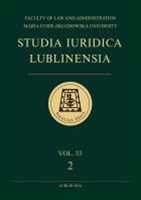Lack of Fair Judicial Review of Pre-Trial Detention after Surrendering the Prosecuted Person as an Absolute Obstacle to Extradition
Lack of Fair Judicial Review of Pre-Trial Detention after Surrendering the Prosecuted Person as an Absolute Obstacle to Extradition
Author(s): Przemysław TarwackiSubject(s): Civil Law, Sociology of Law, Court case
Published by: Wydawnictwo Naukowe Uniwersytetu Marii Curie-Sklodowskiej
Keywords: extradition; personal security of the defendant; obstacles to extradition; prompt judicial review of pre-trial detention; ex officio judicial review of pre-trial detention;
Summary/Abstract: The article is a research and scientific study prepared using the dogmatic method. It addresses the most sensitive issues that the Polish Supreme Court has dealt with in recent years in the area of interpretation of obstacles to extradition, i.e. the problem of the lack of prompt and ex officio judicial review of non-judicial pre-trial detention at the stage of preparatory proceedings in the State requesting the extradition of a prosecuted person. In one of its rulings, which is crucial in this matter, the Supreme Court took the position that this deficiency was not a sufficient basis for finding a legal obstacle to extradite the prosecuted. The argumentation of the Court does not deserve full approval. It is a manifestation of failure to notice the requirement, under Article 5 (3) of the European Convention on Human Rights and Article 9 (3) of the International Covenant on Civil and Political Rights, to bring each detained person promptly ex officio before a judge in the context of their personal security. It should be assumed that the lack of prompt and ex officio review of pre-trial detention at the stage of the preparatory proceedings, including bringing the detained person before a judge, after the defendant has been transferred to the authorities of the requesting state, may constitute grounds for assuming that there is a well-founded concern about violation of the defendant’s personal security for this reason. Such an assessment should be made a casu ad casum as necessary, after supplementing the information from the requesting party
Journal: Studia Iuridica Lublinensia
- Issue Year: 33/2024
- Issue No: 2
- Page Range: 281-298
- Page Count: 18
- Language: English

